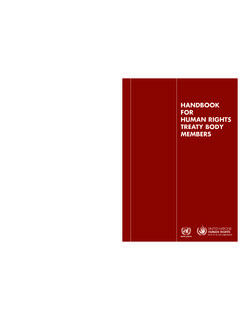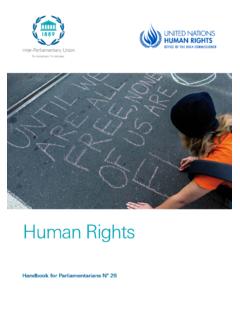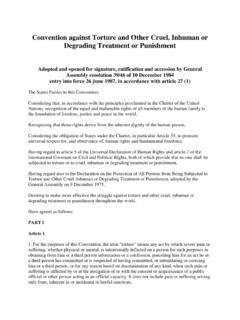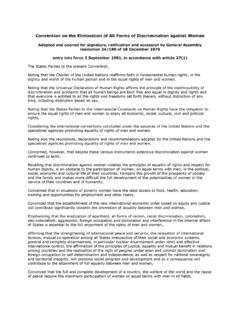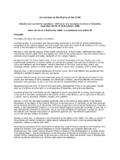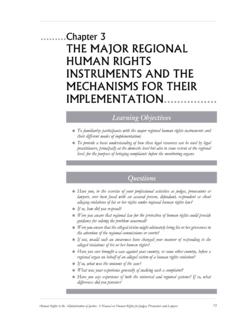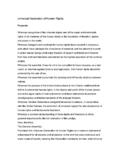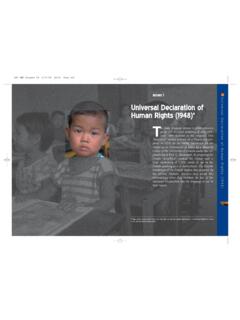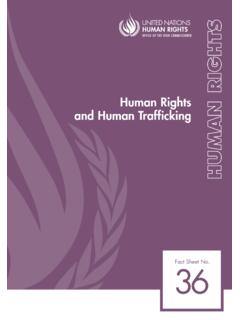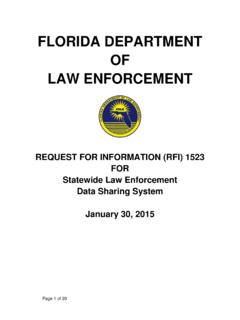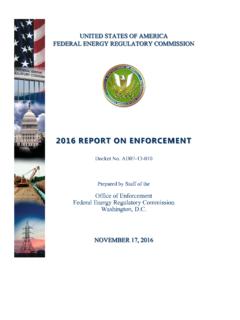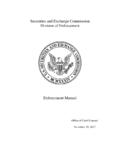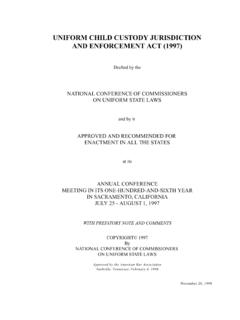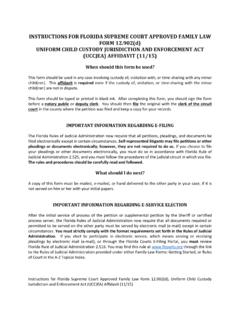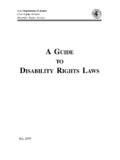Transcription of International Human Rights Standards for Law …
1 UNITED NATIONS HIGH COMMISSIONER FOR Human Rights CENTRE FOR Human Rights International Human Rights Standards for Law enforcement A Pocket Book on Human Rights for the Police Geneva Introductory Note The United Nations Centre for Human Rights has been engaged for years in the training of national law enforcement officials and civilian police components of United Nations peacekeeping operations, with the objective of broadening understanding of International Standards for Human Rights and policing. Most recently, the Centre has prepared both a comprehensive training manual for police, and a complementary trainer's guide, based upon the police training experience and methodology of the Centre.
2 This "pocket book" is the third global contribution of the Centre's police training programme, and is designed to provide a readily accessible and portable reference for police committed to the lawful and humane performance of their vital functions in a democratic society. It contains hundreds of relevant Standards , reduced to common language and point-form, and drawn from over thirty International sources. Rather than directly reproducing the often complex provisions of International treaties and declarations, this publication has adopted a more "user friendly" format, with subjects arranged according to police duties, functions and topics.
3 For users interested in referencing the original sources themselves, each standard is accompanied by a complete endnote, identifying the particular International provisions from which it is derived. Readers are encouraged to contact the Centre for Human Rights for additional copies, or to obtain the complementary Manual and Trainer's Guide produced by the Centre as a part of its police programme. 2 Contents General Ethical and Legal Policing in Non-Discrimination in Law Police The Use of Accountability for the Use of Force and Permissable Circumstances for the Use of Procedures for the Use of After the Use of Civil States of Armed Protection of The Human Rights of Police Command and Community Police Violations of Human 3 Human Rights Standards for Policei General Principles International Human Rights law is binding on all States and their agents, including law enforcement officialsii Human Rights is a legitimate subject for International law.
4 And International scrutinyiii Law enforcement officials are obliged to know, and to apply, International Standards for Human rightsiv Ethical and Legal Conduct Human Rights derive from the inherent dignity of the Human personv Law enforcement officials shall at all times respect and obey the lawvi Law enforcement officials shall at all times fulfil the duty imposed upon them by law, by serving the community and by protecting all persons against illegal acts, consistent with the high degree of responsibility required by their professionvii Law enforcement officials shall not commit any act of corruption. They shall rigorously oppose and combat all such actsviii Law enforcement officials shall respect and protect Human dignity and maintain and uphold the Human Rights of all personsix Law enforcement officials shall report violations of those laws, codes and sets of principles which protect and promote Human rightsx All police action shall respect the principles of legality, necessity, non-discrimination, proportionality and humanityxi Policing in Democracies In the excercise of his Rights and freedoms.
5 Everyone shall be subject only to such limitations as are determined by lawxii Limitations on the excercise of Rights and freedoms shall be only those necessary to secure recognition and respect for the Rights of others, and for meeting the just requirements of morality, public order and the general welfare in a democratic societyxiii Everyone has the right to take part in the government of his country, directly or through freely chosen representativesxiv 4 The will of the people is the basis of the authority of governmentxv The will of the people shall be expressed in periodic and genuine elections which shall be by universal and equal suffragexvi Every law enforcement agency shall be representative of and responsive and accountable to the community as a wholexvii Everyone has the Rights to freedom of opinion, expression, assembly and associationxviii All police officials are part of.
6 And have a duty to serve the communityxix Non-Discrimination in Law enforcement All Human beings are born free and equal in dignity and rightsxx Human Rights derive from the inherent dignity of the Human personxxi Law enforcement officials shall at all times fulfil the duty imposed on them by law, by serving the community and by protecting all persons against illegal actsxxii Law enforcement officials shall respect and protect Human dignity and maintain and uphold the Human Rights of all personsxxiii All persons are equal before the law, and are entitled, without discrimination, to equal protection of the lawxxiv In protecting and serving the community, police shall not unlawfully discriminate on the basis of race, gender, religion, language, colour, political opinion, national origin, property, birth, or other statusxxv It shall not be considered unlawfully discriminatory for the police to enforce certain special measures designed to address the special status and needs of women (including pregnant women and new mothers)
7 , juveniles, the sick, the elderly, and others requiring special treatment in accordance with International Human Rights standardsxxvi The recruitment, hiring, assignment and promotions policies of police agencies shall be free from any form of unlawful discriminationxxvii Police Investigations In investigations, the interviewing of witnesses, victims and suspects, personal searches, searches of vehicles and premises, and the interception of correspondence and communications: Everyone has the right to security of the personxxviii 5 Everyone has the right to a fair trialxxix Everyone is to be presumed innocent until proven guilty in a fair trialxxx No one shall be subjected to arbitrary interference with his privacy, family, home or correspondencexxxi No one shall be subjected to unlawful attacks on his honour or reputationxxxii No pressure, physical or mental, shall be exerted on suspects, witnesses.
8 Or victims in attempting to obtain informationxxxiii Torture and other inhuman or degrading treatment is absolutely prohibitedxxxiv Victims and witnesses are to be treated with compassion and considerationxxxv Confidentiality, and care in the handling of sensitive information are to be exercised at all timesxxxvi No one shall be compelled to confess or to testify against themselvesxxxvii Investigatory activities shall be conducted only lawfully and with due causexxxviii Neither arbitrary, nor unduly intrusive investigatory activities shall be permittedxxxix Investigations shall be competent, thorough, prompt, and impartialxl Investigations shall serve to identify victims; recover evidence; discover witnesses; discover cause, manner, location, and time of crime.
9 Identify and apprehend perpetratorsxli Crime scenes shall be carefully processed, and evidence carefully collected and preservedxlii Arrest Everyone has the right to liberty and security of the person and to freedom of movementxliii No one shall be subjected to arbitrary arrest or detentionxliv No one shall be deprived of his liberty except on such grounds and in accordance with such procedures as are established by lawxlv Anyone who is arrested shall be informed, at the time of the arrest, of the reasons for his arrestxlvi Anyone who is arrested shall be promptly informed of any charges against himxlvii Anyone who is arrested shall be brought promptly before a judicial authorityxlviii 6 Anyone who is arrested shall have the right to appear before a judicial authority for the purpose of having the legality of his arrest or detention reviewed without delay, and shall be released if the detention is found to be unlawfulxlix Anyone who is arrested has the right to trial within a reasonable time.
10 Or to releasel Detention pending trial shall be the exception rather than the ruleli All arrested or detained persons shall have access to a lawyer or other legal representative, and adequate opportunity to communicate with that representativelii A record of every arrest must be made, and shall include: the reason for the arrest; the time of the arrest; the time transferred to a place of custody; the time of appearance before a judicial authority; the identity of involved officers; precise information on the place of custody; and details of The arrest record shall be communicated to the detainee, or to his legal counselliv The family of the arrested person shall be notified promptly of his arrest and place of detentionlv No one shall be compelled to confess or to testify against himselflvi Where necessary, an interpreter shall be provided during interrogationlvii Detention Pre-trial detention shall be the exception.
